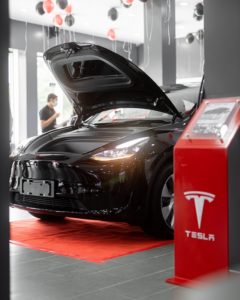If you’re currently in the market for an EV, you might have noticed that electric car prices have increased and the waitlist for a new car could take months or years. This is due to skyrocketing demand, supply chain issues, scarcity of key raw materials, and other factors. We understand the challenges to get your hands on an EV, which is why we’re here to make sense of it and offer a solution.
Increased Demand for EVs
Due to a larger public awareness of the importance of reducing greenhouse gas emissions and the high fuel prices, the demand for electric vehicles has also increased dramatically over the past several years.
According to Globe News Wire, the global electric vehicle market size is projected to reach 34,756 thousand units by 2030, from an estimated 4,093 thousand units in 2021. This growth has been and will continue to be dominated by electric passenger cars, the largest and fastest growing segment in the overall EV market.
Major factors that account for the increased demand for EVs include: increasing customer awareness, the availability of a wide range of models, upgraded technology, and availability of subsidies and tax rebates from governments. Many governments extended electric car subsidies for a further two years after the pandemic broke out, although with a planned reduction of 10% in 2021, and 30% in 2022.
The fast growth of EV chargers has also led to the growth of the EV passenger car market. The greater range of options for EVs also accounts for the increasing demand. The auto industry is setting more ambitious targets and releasing more attractive electric models. This is especially true for major car manufacturers such as Tesla, Toyota, and Hyundai.
The EV Supply Dilemma

The high demand for EVs has outpaced supply. Those who are in the market for an EV have the option of placing an order on a new vehicle. However, the wait time could be as long as 2 years in some cases. In the meantime, those on the waitlist could incur high costs of gas and maintenance while waiting for the new car to arrive.
Part of the problem comes from the supply chain. The worldwide microchip shortage is problematic for EVs, which require around twice as many chips as equivalent conventional vehicles, mostly due to additional power electronics components. It is possible that without these disruptions, electric car sales could have been even higher in 2021. Several EV factory lines were mothballed for weeks, causing delays in the delivery of EVs.
Bulk material prices have been increasing for the entire auto industry. In 2021, the price of steel rose by as much as 100%, aluminium around 70%, and copper more than 33%, affecting both conventional and electric cars. For electric cars, additional challenges are posed by increased prices for materials needed to manufacture batteries: the price of lithium carbonate increased by 150% year on year, graphite by 15%, and nickel by 25%, to name just a few. These cost increases are then passed on to the consumers. The cost of a new electric vehicle in Canada ranges between $32,000 and $160,000, before adding on extra costs such as optional add-ons and insurance. While some of the supply constraints of 2021 will ease as the market rebalances, others may linger.
The Solution: Pre-Owned EVs

Buying a brand new EV can be expensive, and costs keep increasing due to the rising prices of raw materials. Putting yourself on the waitlist for a new EV passenger car means potentially waiting many months or a few years, while you continue to spend money on gas and regular car maintenance. So why not purchase a pre-owned electric vehicle now and save on fuel and maintenance today?
EV Network provides a wide range of electric vehicles that are affordable for everyone. Our online platform is designed with the consumer in mind. You can compare and contrast everyday great prices, trims, battery ranges, features, and options for your dream EV. Buying or renting a pre-owned EV is as easy as a few clicks. You can even book an EV test drive online.
In certain Canadian provinces, there are financial incentives for buying used EVs. In Ontario, the Used EV Incentive Program provides $1,000 toward the purchase of a used fully electric car. This incentive does not include plug-in hybrids. The car must be registered and insured in Ontario, be for personal-use and have a re-sale sticker price below $50,000 CDN before taxes. The Scrappage Incentive Program offers $1,000 toward the purchase of a used fully electric or plug-in hybrid electric car when you scrap your old gas-powered car. This means more money in your pocket!
What are you waiting for? Click here to browse our selection of used EVs available for purchase and book a test drive!

